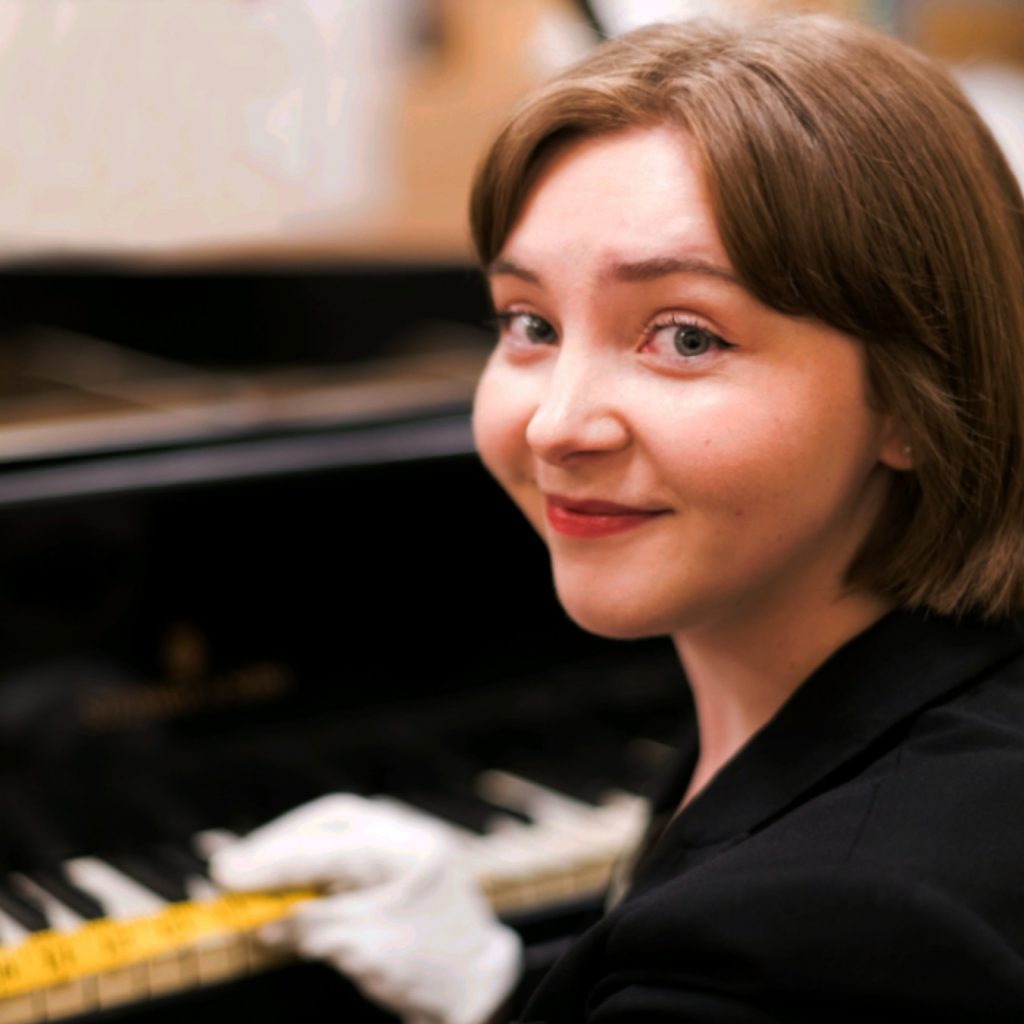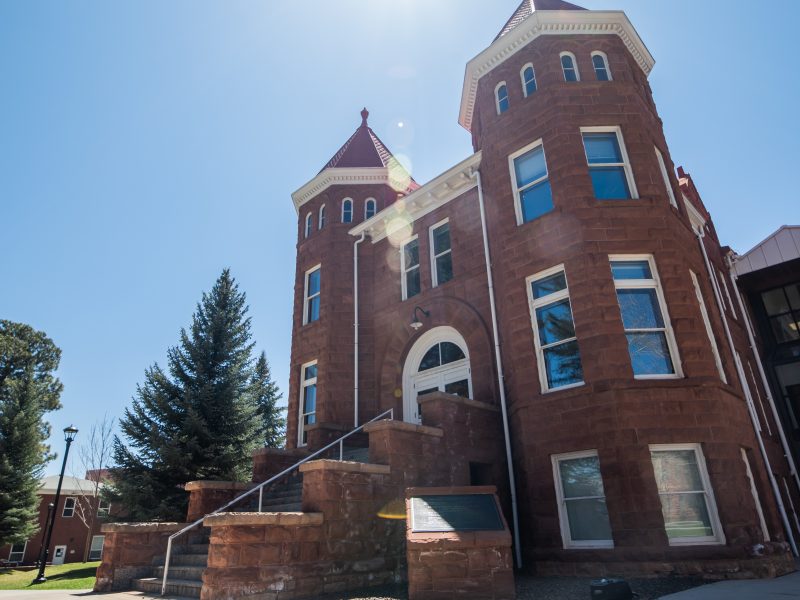Terra Smith: History & Museum Studies, Class of 2018
What motivated you to enroll at NAU?
I was motivated to enroll at NAU for its fabulous study abroad program, its huge variety of clubs and organizations, and the incredible campus lifestyle that Flagstaff offers. I knew that I wanted to experience a study-abroad program, and NAU provided so many options to choose from! It seemed very manageable and tailored to my needs.
I had been quite involved in clubs during high school and knew the benefits of having a community of my peers. NAU students at the time said that whatever activity you were interested in, whether it was academic clubs, sports clubs, art clubs, or technology clubs, there was something for everyone to get into.
I visited many different campuses before I settled on NAU, and Flagstaff could not be beat for its beautiful and walkable campus, its connectedness to the city of Flagstaff, and its ideal location in Arizona with easy access to gorgeous surrounding landscapes.
Why and how did you select your final major and minor at NAU?
Museums have always been a passion of mine, and so when I was deciding on a major, I thought that a History major and Museum Studies minor would be ideal for my interests. I decided to add the Honors portion in order to ensure I was challenging myself as much as possible.
The variety in courses in History meant that I could explore topics from Gandhi’s India to Ancient Rome, from the Medieval period to Public History. If I could have taken every class the History and Comparative Cultural Studies departments offered, I absolutely would have. I adored hearing what my classmates were learning in their other classes.
A minor in Museum Studies was directly related to my future career choice, and the Comparative Cultural Studies department was incredible in their variety of courses, especially for Art History and Digital Humanities.

In what ways did your NAU coursework prepare you for your career?
NAU was critical to my future career in that I had so much exposure to coursework and experiences that were directly related to the skillset and knowledge base I knew were required.
My classes and independent research always focused on both theory and practice, such as learning about the ethics of museum collections or learning how metadata works, understanding how objects and artwork are displayed, and learning how to tell compelling stories about these displays.
My study abroad experience allowed me to visit museums around Europe, where I could see how many different museums display their collections and how these choices are related to their missions and values.
My internship opportunities provided practical experiences in the field, teaching me how to write catalog labels, how to research artists and maintain records, and how to photograph artwork and write condition reports.
These are skills and knowledge that I use every single day in my current position as a museum registrar. When I left NAU, I knew I could demonstrate the required skills to secure entry into my chosen graduate program, selection for further internships, and finally a position like I have now.
Did you participate in any experiential learning opportunities, like a study abroad or an internship? If so, how did these contribute to your overall NAU experience?
During my time at NAU, I took every opportunity to engage in experiential learning opportunities. I studied abroad for a year in Nottingham, England, took independent study courses, and learned from two internships, one in the NAU Art Museum and another in partnership with Coconino Center for the Arts.
I heard from my friends and NAU alumni that if one was at all inclined to study abroad, there were a ton of options to fit anyone’s degree program. Some of my peers went on summer trips to Italy or spent a few months in Costa Rica; others did a semester-long program. I ultimately chose to spend my sophomore year at Nottingham Trent University in Nottingham, England. Not only did I benefit from the different history courses they offered, but I traveled to different museums to see their collections and learned about other cultures by meeting many other international students. I was able to earn credit for my Honors program by writing a diary for the year I was there, a project that was not only academically useful but is now a personal treasure trove of memories. When I came back to NAU, I volunteered as a Global Ambassador to help international students coming to study in the United States acclimate to their new environment, which was especially fulfilling.
My internships were incredibly valuable hands-on experiences. I not only earned credit and did practical work, but I also was able to ask every question I had of my mentors facilitating the internships. I was able to ask questions about why certain museum practices changed over time, witness all the decision-making that happens behind the scenes, and see the very particular choices that each institution made to connect with their audiences. These experiences were incredibly educational, and I had so much fun learning about the things I was the most passionate about. I was able to unpack and photograph Eliza Au’s work while interning with the NAU Art Museum, which was such an honor. I did public reading of stories from Chernobyl for my internship related to “Echoes of Loss” at the Coconino Center for the Arts. I even had a private tour of the collections at the Pioneer Museum and learned about their collections management through an independent study. All of these experiences deeply connected me to the history of Flagstaff and the history of NAU itself.
What campus activities did you participate in while you were a student?
I joined the university’s History Club, where I eventually served as Vice President and then President. I was able to organize lectures, trivia nights, and trips to local sites, while also connecting with other students who were interested in the same topics. In my senior year, I joined Phi Alpha Theta, a history organization, as their publicist and historian (yes, I was thrilled to be the historian for a history club!). I also was a part of the Residence Hall Association representing the students living in Campbell & Morton Hall on North Campus. This helped me meet many of the students in my hall and allowed me to organize fun events for everyone to enjoy. I even got to travel for a AURH conference. My friends and I would often enjoy campus activities such as the movie nights in Prochnow Auditorium, the sporting events at the Dome, concerts in Ardrey Auditorium, or even tie-dying t-shirts in the Central Quad. There were always so many incredible events going on that we never ran out of ways to connect to campus and to other students.
What part of your NAU experience do you value most highly today, and what could NAU have done better to prepare you for the future?
I really value the time I spent making connections with the incredible staff on campus. I was able to connect to a life-long mentor through my professor, Dr. Rebekah Pratt-Sturges, who is a truly inspiring teacher and made sure to provide me with every opportunity for success. So many of my lecturers and professors were thrilled to connect with their students and to make sure we were thriving, and my experience would not have prepared me as much if I had not received such brilliant mentorship and encouragement. Studying at NAU was one of the greatest joys of my life, and my coursework and internships were only as pivotal to my career as they were because of the dedicated staff.
While I attempted to use every resource and took every opportunity possible during my time at NAU, I could have been better prepared if there was a more solid infrastructure for networking. Mentorship and connections really do make the difference when you are applying for jobs or looking for graduate programs, and every department on campus should have a dedicated networking program. While general career advice is always helpful, it really is the connections to your chosen field that make the biggest difference.
